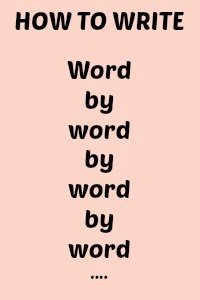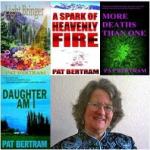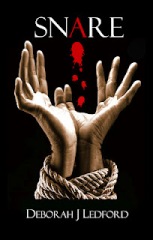Book marketing expert, Penny Sansevieri, shares 10 tips for success:
When it comes to
books, promotion, and book production I know that it can sometimes feel like a
minefield of choices. And while I can’t address each of these in detail, there
are a number of areas that are keenly tied to a book’s success (or lack
thereof). Here are ten for you to consider:
1) Not Understanding
the Importance of a Book CoverI always find it interesting that
authors will sometimes spend years writing their books and then leave the cover
design to someone who either isn't a designer, or doesn't have a working
knowledge of book design or the publishing industry. Or,
worse, they create a
design without having done the proper market research.
Consider these
facts for a minute: shoppers in a bookstore spend an average of 8 seconds
looking at the front cover of a book and 15 seconds looking at the back before
deciding whether to buy it. Further, a survey of booksellers showed that 75% of
them found the book cover to be the most important element of the book. Also,
sales teams at book distribution often
only take the book cover
with them when they shop titles into stores. And finally, please don’t attempt
to design your own book cover. Much like cutting your own hair this is never a
good idea.
2) Sometimes You Get What You Pay
ForThere’s an old saying that goes: You can find a cheap lawyer
and a good lawyer, but you can’t find a good lawyer who is cheap. Though this is
a very different market, it’s kind of the same thing.
Yes, there are
deals out there and that’s not to say that you have to pay a good publicity
person tens of thousands of dollars, but if you find someone who’s willing to
market you for $200 or something like that, I’d be asking questions about what
you get for your money because while $200 dollars isn't much, it’s $200 here and
$99 there and eventually, it all adds up. So if a deal seems too good to be
true, make sure that you’re getting all the facts. Just because they aren't
charging you a lot doesn't mean they shouldn't put it in writing. And by in
writing I mean you should get a detailed list of deliverables. Finding a deal
isn't a bad thing, but if you’re not careful it might just be a waste of money
so ask good questions before you buy.
3) Listening to People Who
Aren't ExpertsWhen you ask someone’s opinion about your book,
direction, or topic, make sure they are either working in your industry or know
your consumer. If, for example, you have written a young adult (YA) book, don’t
give it to your co-workers to read and get feedback (yes, I know some YA books
have adult market crossover appeal but this is different). If you've written a
book for teens, then give it to teens to read. Same is true for self-help, diet,
romance. Align yourself with your market. You want the book to be right for the
reader, in the end that’s all that matters.
4) Hope is not a
Marketing PlanI love hope. Hope is a wonderful thing, but one
thing it isn't is a marketing plan. Hoping that something will happen is one
thing, but leaving your marketing to “fate” is quite another. Even though you
wrote the book, even though you toiled hours making it perfect and even though
you feel that you have enough people you know who will buy it and/or recommend
it to friends, you still have to market it.
More often than not authors
tell me that they can’t seem to get family or friends to buy their book. I know
that sounds odd but it’s true and even if they do, that’s what? One hundred
copies at the most? While family and friends do want to help, you shouldn't bank
on them for success. So when it comes time to get your book out there, you need
to have a solid plan in place or at the very least a set of actions you feel
comfortable working on. Waiting on a miracle, a sale, or a sign from above will
cost you a lot in terms of book aging. Once your book is past a certain “age” it
gets harder and harder to get it reviewed so don’t sit idly by and hope for
something to happen. Make it happen. A book is not the field of dreams, just
because you wrote it doesn't mean readers will beat a path to your
door.
5) Work it, or NotThere’s a real fallacy
that exists in publishing and it’s this: “instant bestseller.” Anyone who has
spent any amount of time in the industry knows there is no such thing as
“instant” and certainly the words “overnight success” are generally not reserved
for books. There is also the belief that a “miracle” will just happen to you
when you publish. Personally I love miracles but they tend to not happen with
books, sadly. Book promotion should be viewed as a long runway. Meaning that you
should plan for the long term. Don’t spend all your marketing dollars in the
first few months of a campaign, make sure you have enough money or personal
momentum to keep it going.
Whether or not you hire a firm you must “work
it” – meaning working your marketing plan, working your goals, whatever.
Publishing is a business. You’d never open up a store and then just sit around
hoping people show up to buy your stuff. You advertise, you run specials, you
pitch yourself to local media. You work it. But what does “working it” mean?
Well, it means that if you have a full-time job you find time each week to push
the book in some form or fashion. You find time, you make time. You should be
engaged in your own success, even if you hire someone to do this for you, you
should still be involved. Sometimes it doesn't take much, but it does take a
consistent effort, whatever that is. I have a friend who is losing weight. She’s
lost 19 pounds over three months. Maybe that seems like pretty slow weight loss,
right? I mean who wants to wait three months for a measly 19 pounds? Still,
she’s ahead, she’s doing little things that make a big difference. Time will
pass anyway. How will you use it?
6) Not Understanding
TimingWhile timing in publishing has essentially become
obsolete, things like advanced reviews, advanced pitching and early sales into
bookstores aren't the be-all-end-all they once were. Still, timing is important.
While it’s true that sometimes older books can see a surge of success it’s not
the rule. You’ll want to be prepared with your marketing early. In fact, you
should have a plan in place months before the book is out. That doesn't mean
that you’re sending 200 review copies out, that just means you have your ducks
in a row so to speak and you know what your plan will be.
Also, timing
can affect things like book events (especially if you’re trying to get into
bookstores). Understand when you should pitch your book for review, start to get
to know your market and the bloggers you plan to pitch. Create a list and keep
close track of who to contact and when you need to get your review pitch out
there. Though many things have changed in regards to timing, it doesn't mean you
shouldn't plan. I recommend that you sit down with someone who can help you
strategize timing so you can plan appropriately for your book launch. A missed
date is akin to a missed opportunity.
7) Hiring People Who Aren't
in the Book IndustryLet’s face it, even to those of us who have
been in this industry for a while it still doesn't always make sense. Hiring
someone who has no book or publishing experience isn't just a mistake, it could
be a costly error. With some vendors like web designers you can get away with
that. But someone who has only designed business cards can’t, for example,
design a book cover. Make sure you hire the right specialist for the right
project. Also, you've likely spent years putting together this project, make
sure you make choices based on what’s right and not what’s cheapest. If you shop
right you can often find vendors who are perfect for your project and who fit
your budget.
8) Designing Your Own WebsiteYou
should never cut your own hair or design your own site. Period. End of story.
But ok, let me elaborate. Let’s say you designed your own site which saved you a
few thousand dollars paying a web designer. Now you’re off promoting your book
and suddenly you’re getting a gazillion hits to your site. The problem is the
site is not converting these visitors into a sale. How much money did you lose
by punting the web designer and doing it yourself? Hard to know. Scary, isn't
it?
9) Becoming a Media DivaLet’s face it, you
need the media more than they need you. I know. Ouch. But it’s the unfortunate
truth. So here’s the thing: be grateful. Thank the interviewer, send a follow up
thank-you note after the interview. Don’t expect the interviewer to read your
book and don’t get upset if they get some facts wrong. Just gently, but
professionally, correct them in such a way that they don’t look bad or stupid.
Never ask for an interview to be redone. Most media people don’t have the time.
I mention this because it actually happened to a producer friend of mine who did
an interview with a guy and he decided he didn't like it and wanted a second
shot. Not gonna happen. The thing is, until you get a dressing room with
specially designed purple M&M’s, don’t even
think about
becoming a diva. The best thing you can do is create relationships. Show up on
time, show up prepared, and always, always, always be
grateful.
10) Take AdvantageIn this instance, I
mean take advantage in the best possible way. There are a ton of resources out
there for you. Seriously. Compared to when I was first in business almost 13
years ago the resources and free promotional tools that are out there now are
almost mind-numbing, and the fact that so many authors don’t take advantage of
them is even crazier.
Things like social media - I know it’s a time suck
but you would be amazed at how many authors rock out their campaign by just
being on Facebook, or Wattpad or even Goodreads. When I wrote a Goodreads
article a while back I got some interesting feedback from people who said that
there was a lot of negativity on there. Well, that may be so but I've never seen
it and if I do, I ignore it. Point being, the stuff is out there. Find out for
yourself what works and what doesn't. Yes it’s fine to take advice from other
authors but you should still experience this for yourself before you decide if
it’s right for you or not.
When it comes to marketing, the mistakes can
cost you more than anything both in time and money. Knowing what to do to market
your book is important, but knowing what to avoid may be equally as significant.
* * *
Reprinted from "The Book Marketing Expert newsletter," a free ezine offering
book promotion and publicity tips and techniques.
http://www.amarketingexpert.com












